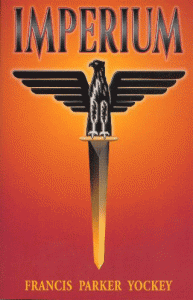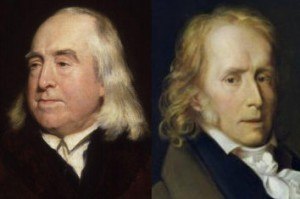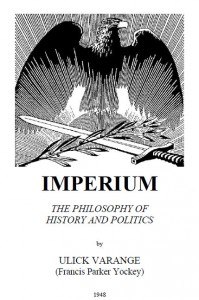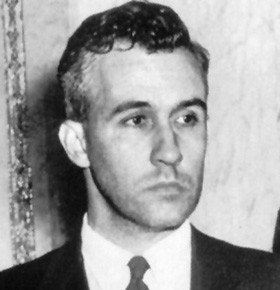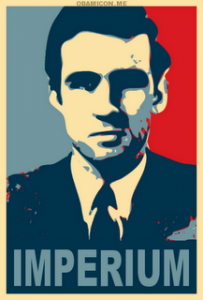Podcast: Play in new window | Download
Deep in the weeds of Yockey’s critique of liberalism. Continuing with Imperium, The 20th Century Political Outlook, p212:
A moment’s reflection shows that Liberalism is entirely negative. It is not a formative force, but always and only a disintegrating force. It wishes to depose the twin authorities of Church and State, substituting for them economic freedom and social ethics. It happens that organic realities do not permit of more than the two alternatives: the organism can be true to itself, or it becomes sick and distorted, a prey for other organisms. Thus the natural polarity of leaders and led cannot be abolished without annihilating the organism. Liberalism was never entirely successful in its fight against the State, despite the fact that it engaged in political activity throughout the 19th century in alliance with every other type of State-disintegrating force. Thus there were National-Liberals, Social-Liberals, Free-Conservatives, Liberal-Catholics. They allied themselves with democracy, which is not Liberal, but irresistibly authoritarian in success. They sympathized with Anarchists when the forces of Authority sought to defend themselves against them. In the 20th century, Liberalism joined Bolshevism in Spain, and European and American Liberals sympathized with Russian Bolsheviks.
Liberalism can only be defined negatively. It is a mere critique, not a living idea. Its great word “freedom” is a negative–it means in fact, freedom from authority, i.e., disintegration of the organism. In its last stages it produces social
This is a reiteration of what we found earlier in Yockey’s description of political organisms, the friend-enemy disjunction, and the Laws of Totality and Sovereignty: liberalism is opposition to authority, a disintegrating force with dissolves political organisms and kills them dead.
Yockey’s view of democracy as “not Liberal, but irresistibly authoritarian in success” differs from the conventional view which conflates and even equates liberalism with democracy – e.g. “liberal democracy”. Yockey delves into democracy next, starting on page 224.
213
atomism, in which not only the authority of the State is combated, but even the authority of society and the family. Divorce takes equal rank with marriage, children with parents. This constant thinking in negatives caused political activists like Marx, Lorenz v. Stein and Ferdinand Lasalle to despair of it as a political vehicle. Its attitudes were always contradictory, it sought always a compromise. It sought always to “balance” democracy against monarchy, managers against hand-workers, State against Society, legislative against judicial. In a crisis, Liberalism as such was not to be found. Liberals found their way on to one or the other side of a revolutionary struggle, depending on the consistency of their Liberalism, and its degree of hostility to authority.
Even while Yockey was writing this, a seminal assault on the authority of White society and families was on its way. The Authoritarian Personality came not from atomistic “liberals” but from jews obsessed with the best interests of their own collective organism:
The Authoritarian Personality is a 1950 sociology book by Theodor W. Adorno, Else Frenkel-Brunswik, Daniel Levinson, and Nevitt Sanford, researchers working at the University of California, Berkeley, during and shortly after World War II.
The Authoritarian Personality “invented a set of criteria by which to define personality traits, ranked these traits and their intensity in any given person on what it called the ‘F scale’ (F for fascist).”
The impetus of The Authoritarian Personality was the Holocaust, the attempted genocidal extinction of European Jews by Adolf Hitler’s National Socialist party. Adorno had been a member of the “Frankfurt School”, a predominantly Jewish[7] group of philosophers and Marxist theorists who fled Germany when Hitler shut down their Institute for Social Research. Adorno et al. were thus motivated by a desire to identify and measure factors that were believed to contribute to antisemitic and fascist traits.
Here we see a contrast in personality traits of Whites and jews. Whites thought the war was over. Jews never stopped fighting. The jews find fault in White thinking. Whites, to the extent they even think about it, agree.
Back to Yockey:
Thus Liberalism in action was just as political as any State ever was. It obeyed organic necessity by its political alliances with non-Liberal groups and ideas. Despite its theory of individualism, which of course would preclude the possibility that one man or group could call upon another man or group for the sacrifice or risk of life, it supported “unfree” ideas like Democracy, Socialism, Bolshevism, Anarchism, all of which demand life-sacrifice.
II
From its anthropology of the basic goodness of human nature in general, Rationalism produced 18th century Encyclopedism, Freemasonry, Democracy, and Anarchism, as well as Liberalism, each with its offshoots and variations. Each played its part in the history of the 19th century, and, owing to the critical distortion of the whole Western Civilization entailed by the first two World Wars, even in the 20th century, where Rationalism is grotesquely out of place, and slowly transformed itself into
214
Irrationalism. The corpse of Liberalism was not even interred by the middle of the 20th century. Consequently it is necessary to diagnose even now the serious illness of the Western Civilization as Liberalism complicated with alien-poisoning.
Because Liberalism views most men as harmonious, or good, it follows that they should be allowed to do as they like. Since there is no higher unit to which all are tied, and whose superpersonal life dominates the lives of the individuals, each field of human activity serves only itself — as long as it does not wish to become authoritative, and stays within the framework of “society.” Thus Art becomes “Art for Art’s sake,” l’art pour l’art. All areas of thought and action become equally autonomous. Religion becomes mere social discipline, since to be more is to assume authority. Science, philosophy, education, all are equally worlds unto themselves. None are subject to anything higher. Literature and technics are entitled to the same autonomy. The function of the State is merely to protect them by patents and copyrights. But above all — economics and law are independent of organic authority, i.e., of politics.
Benjamin Constant, who in Yockey’s estimation was perhaps “the purest expression of the doctrine of Liberalism”, was an early popularizer of the expression art for art’s sake. Also:
A Latin version of this phrase, “Ars gratia artis”, is used as a motto by Metro-Goldwyn-Mayer and appears in the circle around the roaring head of Leo the Lion in its motion picture logo.
Thinking of and speaking to the future, Yockey describes the interplay of freedom, economics and law:
Twenty-first century readers will find it difficult to believe that once the idea prevailed that each person should be free to do as he pleased in economic matters, even if his personal activity involved the starvation of hundreds of thousands, the devastation of entire forest and mineral areas, and the stunting of the power of the organism; that it was quite permissible for such an individual to raise himself above the weakened public authority, and to dominate, by private means, the inmost thoughts of whole populations by his control of press, radio and mechanized drama.
They will find it more difficult yet to understand how such a person could go to the law to enforce his destructive will. Thus a usurer could, even in the middle of the 20th century,
215
invoke successfully the assistance of the law in dispossessing any numbers of peasants and farmers. It is hard to imagine how an individual could injure the political organism more than by thus mobilizing the soil into dust, in the phrase of the great Freiherr von Stein.
Heinrich Friedrich Karl vom und zum Stein:
Heinrich Friedrich Karl Reichsfreiherr[a] vom und zum Stein (25 October 1757 – 29 June 1831), commonly known as Baron vom Stein, was a Prussian statesman who introduced the Prussian reforms that paved the way for the unification of Germany. He promoted the abolition of serfdom, with indemnification to territorial lords; subjection of the nobles to manorial imposts; and the establishment of a modern municipal system.
Stein was from an old Franconian family.
The Prussian reforms were liberalism in action and included emancipation of the jews.
But — this followed inevitably from the idea of the independence of economics and law from political authority. There is nothing higher, no State; it is only individuals against one another. It is but natural that the economically more astute individuals accumulate most of the mobile wealth into their hands. They do not however, if they are true Liberals, want authority with this wealth, for authority has two aspects: power, and responsibility. Individualism, psychologically speaking, is egoism. “Happiness” = selfishness. Rousseau, the grandfather of Liberalism, was a true individualist, and sent his five children to the foundling hospital.
Law, as a field of human thought and endeavor, has as much independence, and as much dependence as every other field. Within the organic framework, it is free to think and organize its material. But like other forms of thought, it can be enrolled in the service of outside ideas. Thus law, originally the means of codifying and maintaining the inner peace of the organism by keeping order and preventing private disputes from growing, was transmuted by Liberal thought into a means of keeping inner disorder, and allowing economically strong individuals to liquidate the weaker ones. This was called the “rule of law,” the “law-State,” “independence of the judiciary.” The idea of bringing in the law to make a given state of affairs sacrosanct was not original with Liberalism. Back in Hobbes’s day, other groups were trying it, but the incorruptible mind of Hobbes said with the most precise clarity that the rule of law means the rule of those who determine and administer the law,
216
that the rule of a “higher order” is an empty phrase, and is only given content by the concrete rule of given men and groups over a lower order.
Who pays the piper calls the tune. He who administers the law rules.

